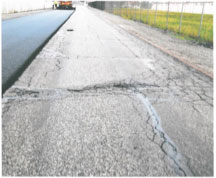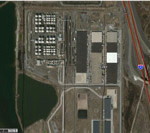ASPHALT PLUS CASE STUDY:
WOLF LAKE RAIL/TRUCK CHEMICAL TRANSFER TERMINAL
Wolf Lake Terminal is located in Northern Indiana, just south of Lake Michigan. The facility moves very large volumes of liquid chemicals and fuels between rail and trucks. The facility entrance road is shared with a Defense Logistics Agency bulk storage facility. The access road from the state highway to the warehouse and loading area.
Because of the heavy volume of loaded truck transport along the access road, use of standard hot mix pavements with a 58, -28 asphalt binder did not hold up well, and the pavement required periodic replacement. In 2008, the existing failing asphalt road surface was cleaned and covered with two inches of rubber asphalt, applied using the Dry Mix process where crumb rubber was used for 15% binder replacement.
The following year, an adjacent section was paved with standard hot mix asphalt using a similar binder. After seven and six years of service respectively, the Dry Mix pavement remains in service and is in good to excellent condition, while the standard hot mix pavement failed. Rubberized Asphalt Wolf Lake Indiana compared with Hot Mix shows the benefits of Dry Mix.
Earlier testing of Dry Mix pavements has clearly demonstrated that these pavements are as effective as polymer-modified asphalts in resisting rutting and reflexive cracking.

2008 Repaving Efforts with Dry Mix Asphalt
Since this facility is located in an area with high levels of freeze-thaw activity and since the area is exposed to periods of unusually cold temperatures during extreme winter cold events, samples of the pavement were cored and subjected to DCT analysis. Even after seven years of service, samples showed good to excellent DCT performance, suggesting that Dry Mix pavements will perform well even in very cold climates.

